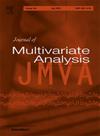鲁棒半功能删节回归
IF 1.4
3区 数学
Q2 STATISTICS & PROBABILITY
引用次数: 0
摘要
本文开发了一个强大的方法框架,用于分析半功能部分线性回归模型中的随机删减响应,利用指数平方损失准则。所提出的方法利用了指数平方损失函数对异常值和重尾误差分布的鲁棒性,同时保留了半函数回归的灵活性和可解释性,在统一的框架中容纳了标量和函数预测因子。为了考虑参数和非参数分量的发散收敛率,我们引入了一种新的三步估计程序,旨在提高计算效率,确保模型鲁棒性,并实现渐近最优估计性能。通过准牛顿算法估计参数分量,并利用wolfe型线搜索策略在标准正则性条件下建立全局收敛性。此外,我们提出了一个基于指数平方损失函数的交叉验证准则,以指导数据驱动的调谐参数选择。在温和的条件下,得到了所提估计量的相合性和渐近正态性。通过一系列模拟研究和对阿尔茨海默病进展的经验应用,证明了该方法的有效性和鲁棒性,突出了其在处理复杂和审查数据结构方面的实际适用性。本文章由计算机程序翻译,如有差异,请以英文原文为准。
Robust semi-functional censored regression
This paper develops a robust methodological framework for analyzing randomly censored responses within the semi-functional partial linear regression models, utilizing the exponential squared loss criterion. The proposed methodology capitalizes on the robustness of the exponential squared loss function against outliers and heavy-tailed error distributions, while preserving the flexibility and interpretability of semi-functional regression, which accommodates scalar and functional predictors in a unified framework. To account for the divergent convergence rates of the parametric and nonparametric components, we introduce a novel three-step estimation procedure designed to enhance computational efficiency, ensure model robustness, and achieve asymptotically optimal estimation performance. The parametric component is estimated through a quasi-Newton algorithm, for which we establish global convergence under standard regularity conditions using a Wolfe-type line search strategy. Additionally, we suggest a cross-validation criterion based on the exponential squared loss function to guide the data-driven selection of tuning parameters. The theoretical properties, including consistency and asymptotic normality of the proposed estimators, are established under mild conditions. The efficacy and robustness of the method are demonstrated through a series of simulation studies and an empirical application to Alzheimer’s disease progression, highlighting its practical applicability in addressing complex and censored data structures.
求助全文
通过发布文献求助,成功后即可免费获取论文全文。
去求助
来源期刊

Journal of Multivariate Analysis
数学-统计学与概率论
CiteScore
2.40
自引率
25.00%
发文量
108
审稿时长
74 days
期刊介绍:
Founded in 1971, the Journal of Multivariate Analysis (JMVA) is the central venue for the publication of new, relevant methodology and particularly innovative applications pertaining to the analysis and interpretation of multidimensional data.
The journal welcomes contributions to all aspects of multivariate data analysis and modeling, including cluster analysis, discriminant analysis, factor analysis, and multidimensional continuous or discrete distribution theory. Topics of current interest include, but are not limited to, inferential aspects of
Copula modeling
Functional data analysis
Graphical modeling
High-dimensional data analysis
Image analysis
Multivariate extreme-value theory
Sparse modeling
Spatial statistics.
 求助内容:
求助内容: 应助结果提醒方式:
应助结果提醒方式:


